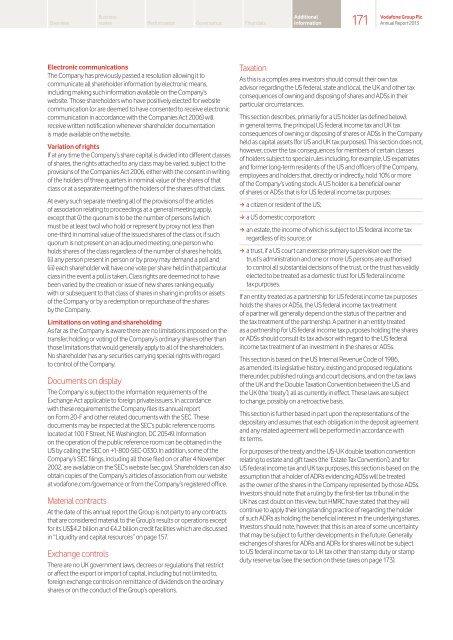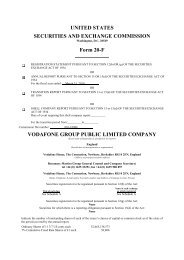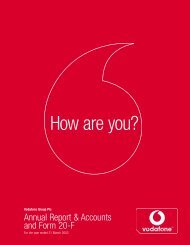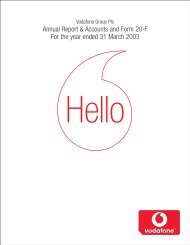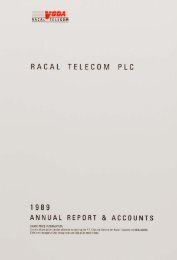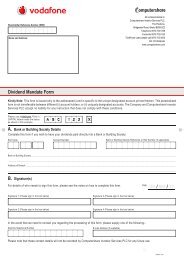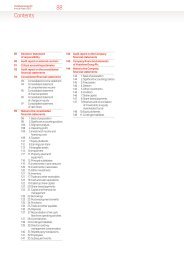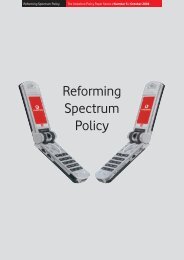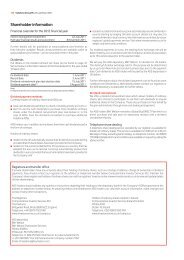The way ahead? - Vodafone
The way ahead? - Vodafone
The way ahead? - Vodafone
You also want an ePaper? Increase the reach of your titles
YUMPU automatically turns print PDFs into web optimized ePapers that Google loves.
Overview<br />
Business<br />
review Performance Governance Financials<br />
Electronic communications<br />
<strong>The</strong> Company has previously passed a resolution allowing it to<br />
communicate all shareholder information by electronic means,<br />
including making such information available on the Company’s<br />
website. Those shareholders who have positively elected for website<br />
communication (or are deemed to have consented to receive electronic<br />
communication in accordance with the Companies Act 2006) will<br />
receive written notification whenever shareholder documentation<br />
is made available on the website.<br />
Variation of rights<br />
If at any time the Company’s share capital is divided into different classes<br />
of shares, the rights attached to any class may be varied, subject to the<br />
provisions of the Companies Act 2006, either with the consent in writing<br />
of the holders of three quarters in nominal value of the shares of that<br />
class or at a separate meeting of the holders of the shares of that class.<br />
At every such separate meeting all of the provisions of the articles<br />
of association relating to proceedings at a general meeting apply,<br />
except that (i) the quorum is to be the number of persons (which<br />
must be at least two) who hold or represent by proxy not less than<br />
one-third in nominal value of the issued shares of the class or, if such<br />
quorum is not present on an adjourned meeting, one person who<br />
holds shares of the class regardless of the number of shares he holds,<br />
(ii) any person present in person or by proxy may demand a poll and<br />
(iii) each shareholder will have one vote per share held in that particular<br />
class in the event a poll is taken. Class rights are deemed not to have<br />
been varied by the creation or issue of new shares ranking equally<br />
with or subsequent to that class of shares in sharing in profits or assets<br />
of the Company or by a redemption or repurchase of the shares<br />
by the Company.<br />
Limitations on voting and shareholding<br />
As far as the Company is aware there are no limitations imposed on the<br />
transfer, holding or voting of the Company’s ordinary shares other than<br />
those limitations that would generally apply to all of the shareholders.<br />
No shareholder has any securities carrying special rights with regard<br />
to control of the Company.<br />
Documents on display<br />
<strong>The</strong> Company is subject to the information requirements of the<br />
Exchange Act applicable to foreign private issuers. In accordance<br />
with these requirements the Company files its annual report<br />
on Form 20-F and other related documents with the SEC. <strong>The</strong>se<br />
documents may be inspected at the SEC’s public reference rooms<br />
located at 100 F Street, NE Washington, DC 20549. Information<br />
on the operation of the public reference room can be obtained in the<br />
US by calling the SEC on +1-800-SEC-0330. In addition, some of the<br />
Company’s SEC filings, including all those filed on or after 4 November<br />
2002, are available on the SEC’s website (sec.gov). Shareholders can also<br />
obtain copies of the Company’s articles of association from our website<br />
at vodafone.com/governance or from the Company’s registered office.<br />
Material contracts<br />
At the date of this annual report the Group is not party to any contracts<br />
that are considered material to the Group’s results or operations except<br />
for its US$4.2 billion and €4.2 billion credit facilities which are discussed<br />
in “Liquidity and capital resources” on page 157.<br />
Exchange controls<br />
<strong>The</strong>re are no UK government laws, decrees or regulations that restrict<br />
or affect the export or import of capital, including but not limited to,<br />
foreign exchange controls on remittance of dividends on the ordinary<br />
shares or on the conduct of the Group’s operations.<br />
Additional<br />
information<br />
Taxation<br />
As this is a complex area investors should consult their own tax<br />
advisor regarding the US federal, state and local, the UK and other tax<br />
consequences of owning and disposing of shares and ADSs in their<br />
particular circumstances.<br />
This section describes, primarily for a US holder (as defined below),<br />
in general terms, the principal US federal income tax and UK tax<br />
consequences of owning or disposing of shares or ADSs in the Company<br />
held as capital assets (for US and UK tax purposes). This section does not,<br />
however, cover the tax consequences for members of certain classes<br />
of holders subject to special rules including, for example, US expatriates<br />
and former long-term residents of the US and officers of the Company,<br />
employees and holders that, directly or indirectly, hold 10% or more<br />
of the Company’s voting stock. A US holder is a beneficial owner<br />
of shares or ADSs that is for US federal income tax purposes:<br />
a a citizen or resident of the US;<br />
a a US domestic corporation;<br />
171<br />
<strong>Vodafone</strong> Group Plc<br />
Annual Report 2013<br />
a an estate, the income of which is subject to US federal income tax<br />
regardless of its source; or<br />
a a trust, if a US court can exercise primary supervision over the<br />
trust’s administration and one or more US persons are authorised<br />
to control all substantial decisions of the trust, or the trust has validly<br />
elected to be treated as a domestic trust for US federal income<br />
tax purposes.<br />
If an entity treated as a partnership for US federal income tax purposes<br />
holds the shares or ADSs, the US federal income tax treatment<br />
of a partner will generally depend on the status of the partner and<br />
the tax treatment of the partnership. A partner in an entity treated<br />
as a partnership for US federal income tax purposes holding the shares<br />
or ADSs should consult its tax advisor with regard to the US federal<br />
income tax treatment of an investment in the shares or ADSs.<br />
This section is based on the US Internal Revenue Code of 1986,<br />
as amended, its legislative history, existing and proposed regulations<br />
thereunder, published rulings and court decisions, and on the tax laws<br />
of the UK and the Double Taxation Convention between the US and<br />
the UK (the ‘treaty’), all as currently in effect. <strong>The</strong>se laws are subject<br />
to change, possibly on a retroactive basis.<br />
This section is further based in part upon the representations of the<br />
depositary and assumes that each obligation in the deposit agreement<br />
and any related agreement will be performed in accordance with<br />
its terms.<br />
For purposes of the treaty and the US-UK double taxation convention<br />
relating to estate and gift taxes (the ‘Estate Tax Convention’), and for<br />
US federal income tax and UK tax purposes, this section is based on the<br />
assumption that a holder of ADRs evidencing ADSs will be treated<br />
as the owner of the shares in the Company represented by those ADSs.<br />
Investors should note that a ruling by the first-tier tax tribunal in the<br />
UK has cast doubt on this view, but HMRC have stated that they will<br />
continue to apply their longstanding practice of regarding the holder<br />
of such ADRs as holding the beneficial interest in the underlying shares.<br />
Investors should note, however, that this is an area of some uncertainty<br />
that may be subject to further developments in the future. Generally<br />
exchanges of shares for ADRs and ADRs for shares will not be subject<br />
to US federal income tax or to UK tax other than stamp duty or stamp<br />
duty reserve tax (see the section on these taxes on page 173).


